Analyzing the Treaty of Waitangi: A New Zealand Healthcare View
VerifiedAdded on 2023/06/03
|22
|2227
|289
Essay
AI Summary
This essay provides a comprehensive analysis of the Treaty of Waitangi from a healthcare perspective, emphasizing its historical background, importance, and different versions. It details the responsibilities of nurses in relation to the Treaty, focusing on the origins of Kawa Whakaruruhau (cultural safety) and the 3P principles: Partnership, Participation, and Protection. The essay further discusses the implementation of the Treaty in nursing practice, the importance of culturally safe health service delivery, and concludes by highlighting the Treaty's role in promoting health equity and well-being for the Maori community, advocating for ethical principles that value all cultures and beliefs. The study also reminds that the application of ethical principles should value the culture and belief of all the communities.
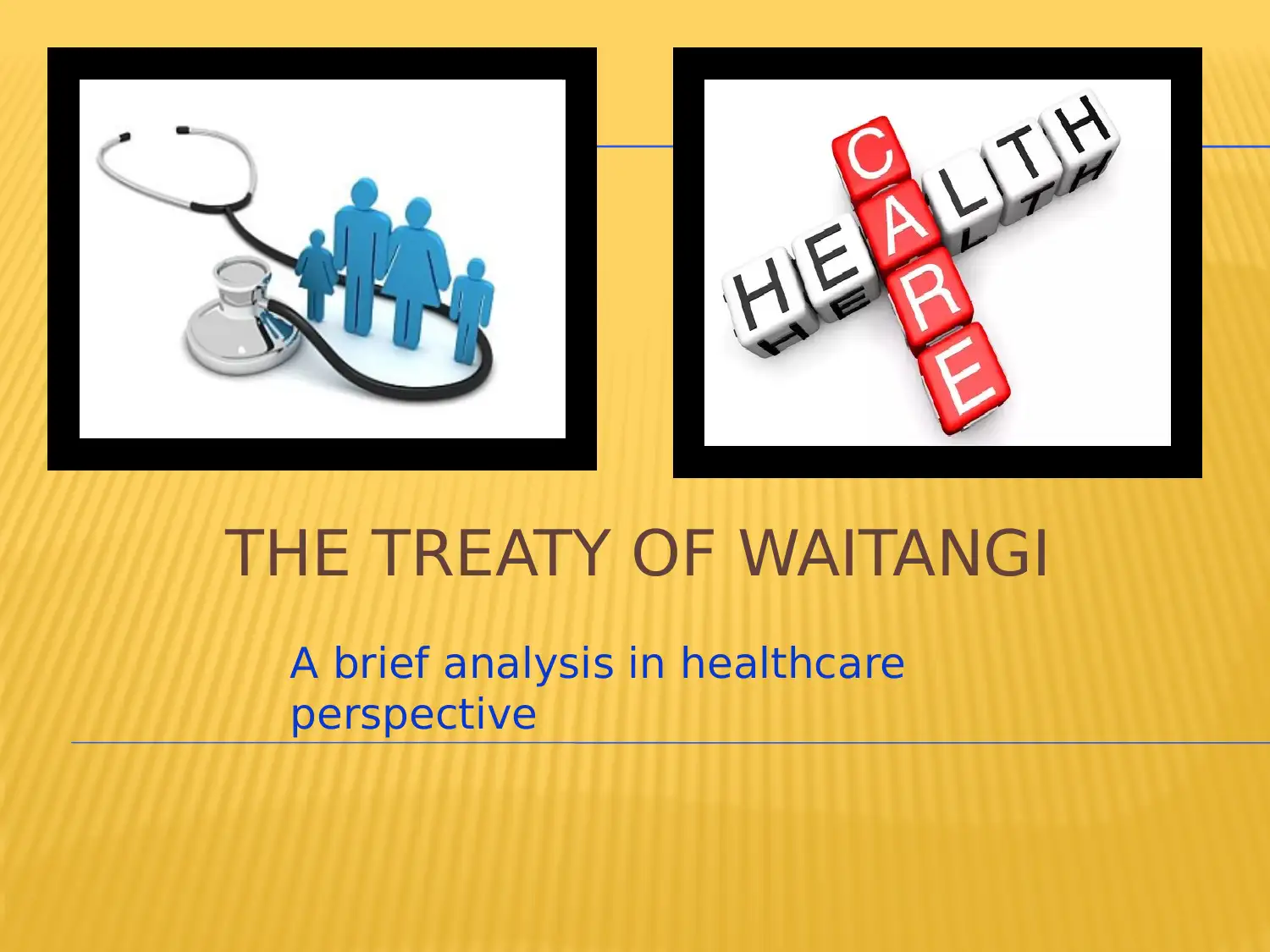
THE TREATY OF WAITANGI
A brief analysis in healthcare
perspective
A brief analysis in healthcare
perspective
Paraphrase This Document
Need a fresh take? Get an instant paraphrase of this document with our AI Paraphraser
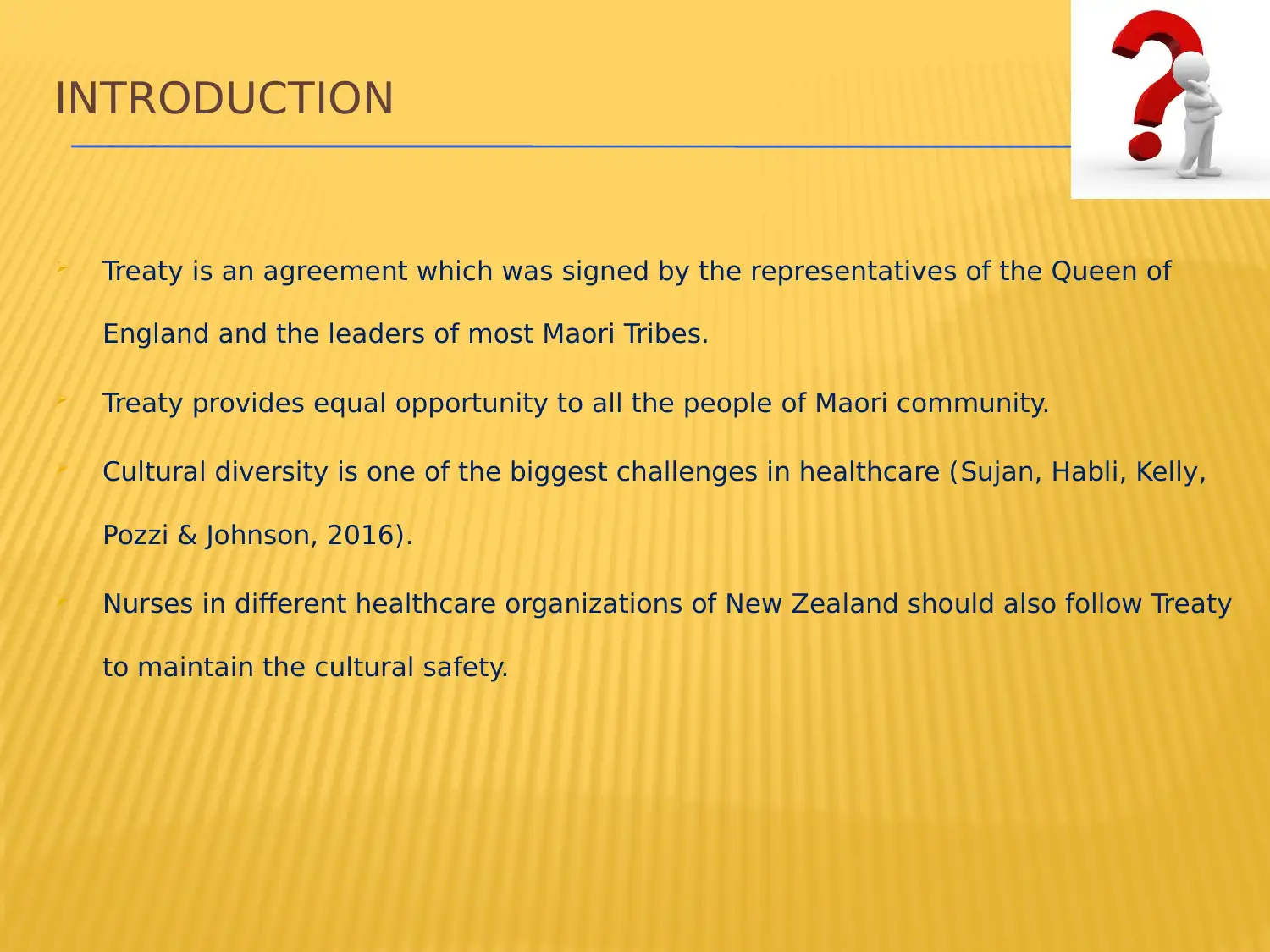
INTRODUCTION
Treaty is an agreement which was signed by the representatives of the Queen of
England and the leaders of most Maori Tribes.
Treaty provides equal opportunity to all the people of Maori community.
Cultural diversity is one of the biggest challenges in healthcare (Sujan, Habli, Kelly,
Pozzi & Johnson, 2016).
Nurses in different healthcare organizations of New Zealand should also follow Treaty
to maintain the cultural safety.
Treaty is an agreement which was signed by the representatives of the Queen of
England and the leaders of most Maori Tribes.
Treaty provides equal opportunity to all the people of Maori community.
Cultural diversity is one of the biggest challenges in healthcare (Sujan, Habli, Kelly,
Pozzi & Johnson, 2016).
Nurses in different healthcare organizations of New Zealand should also follow Treaty
to maintain the cultural safety.
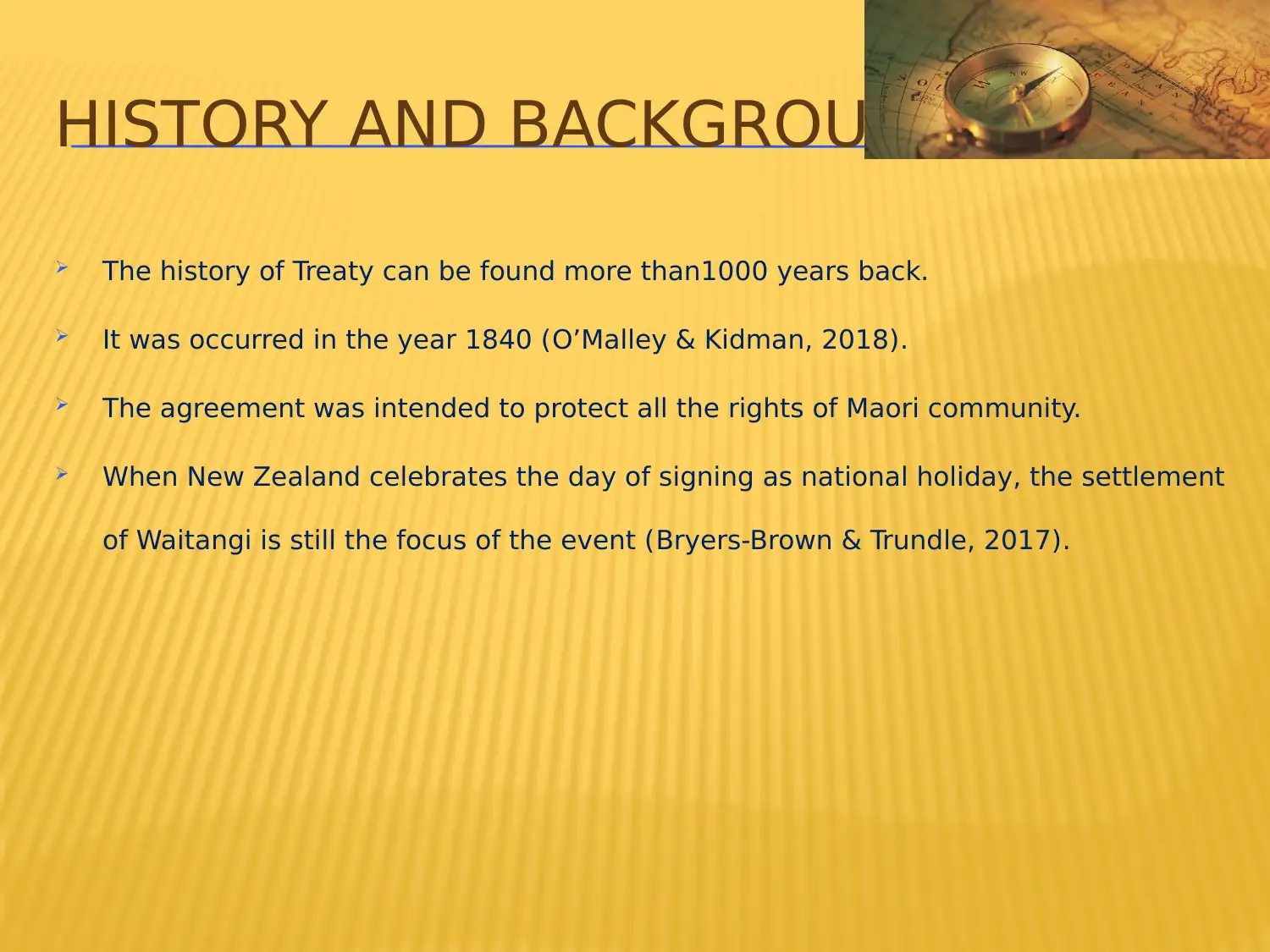
HISTORY AND BACKGROUND
The history of Treaty can be found more than1000 years back.
It was occurred in the year 1840 (O’Malley & Kidman, 2018).
The agreement was intended to protect all the rights of Maori community.
When New Zealand celebrates the day of signing as national holiday, the settlement
of Waitangi is still the focus of the event (Bryers-Brown & Trundle, 2017).
The history of Treaty can be found more than1000 years back.
It was occurred in the year 1840 (O’Malley & Kidman, 2018).
The agreement was intended to protect all the rights of Maori community.
When New Zealand celebrates the day of signing as national holiday, the settlement
of Waitangi is still the focus of the event (Bryers-Brown & Trundle, 2017).
⊘ This is a preview!⊘
Do you want full access?
Subscribe today to unlock all pages.

Trusted by 1+ million students worldwide
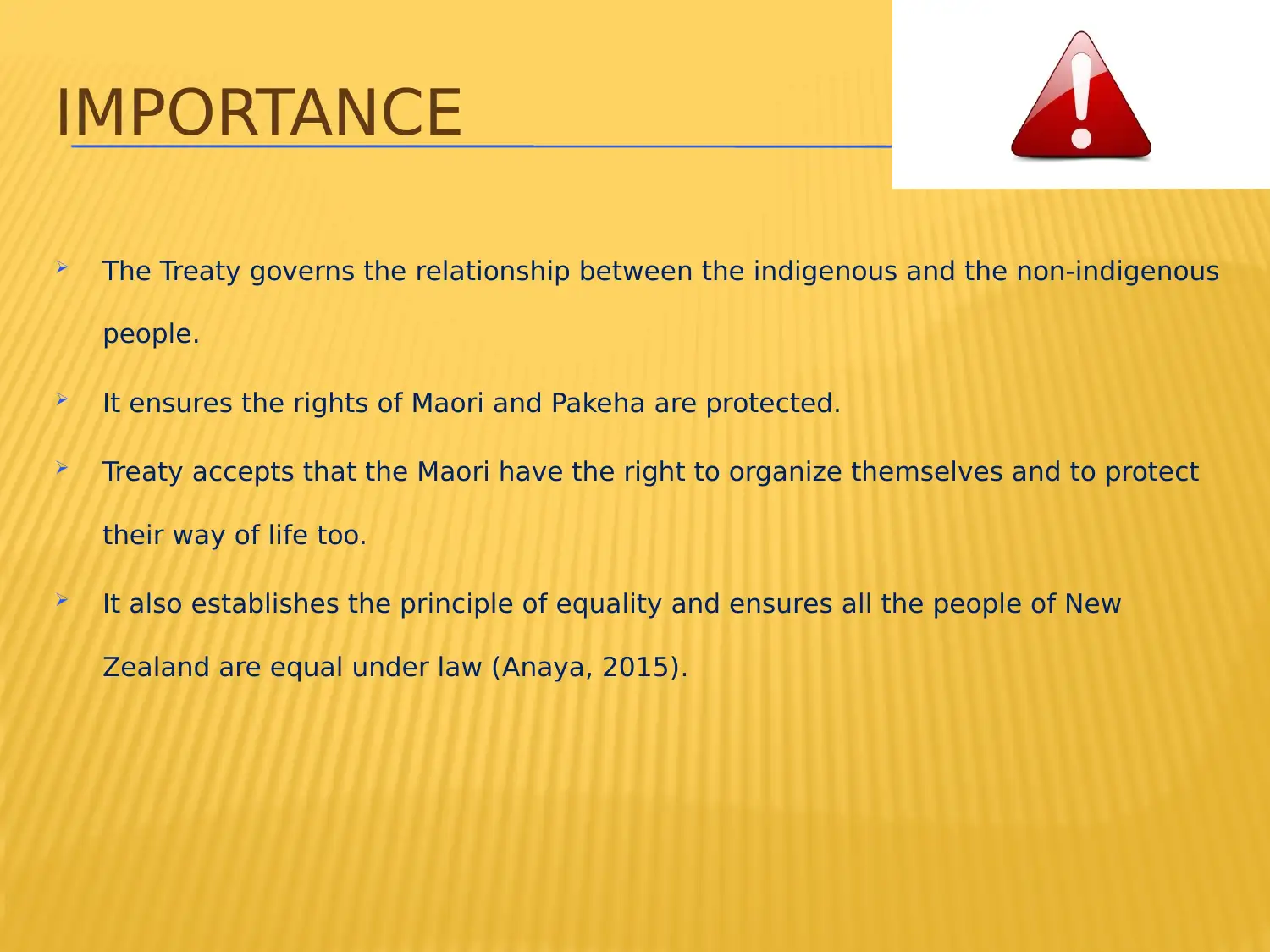
IMPORTANCE
The Treaty governs the relationship between the indigenous and the non-indigenous
people.
It ensures the rights of Maori and Pakeha are protected.
Treaty accepts that the Maori have the right to organize themselves and to protect
their way of life too.
It also establishes the principle of equality and ensures all the people of New
Zealand are equal under law (Anaya, 2015).
The Treaty governs the relationship between the indigenous and the non-indigenous
people.
It ensures the rights of Maori and Pakeha are protected.
Treaty accepts that the Maori have the right to organize themselves and to protect
their way of life too.
It also establishes the principle of equality and ensures all the people of New
Zealand are equal under law (Anaya, 2015).
Paraphrase This Document
Need a fresh take? Get an instant paraphrase of this document with our AI Paraphraser
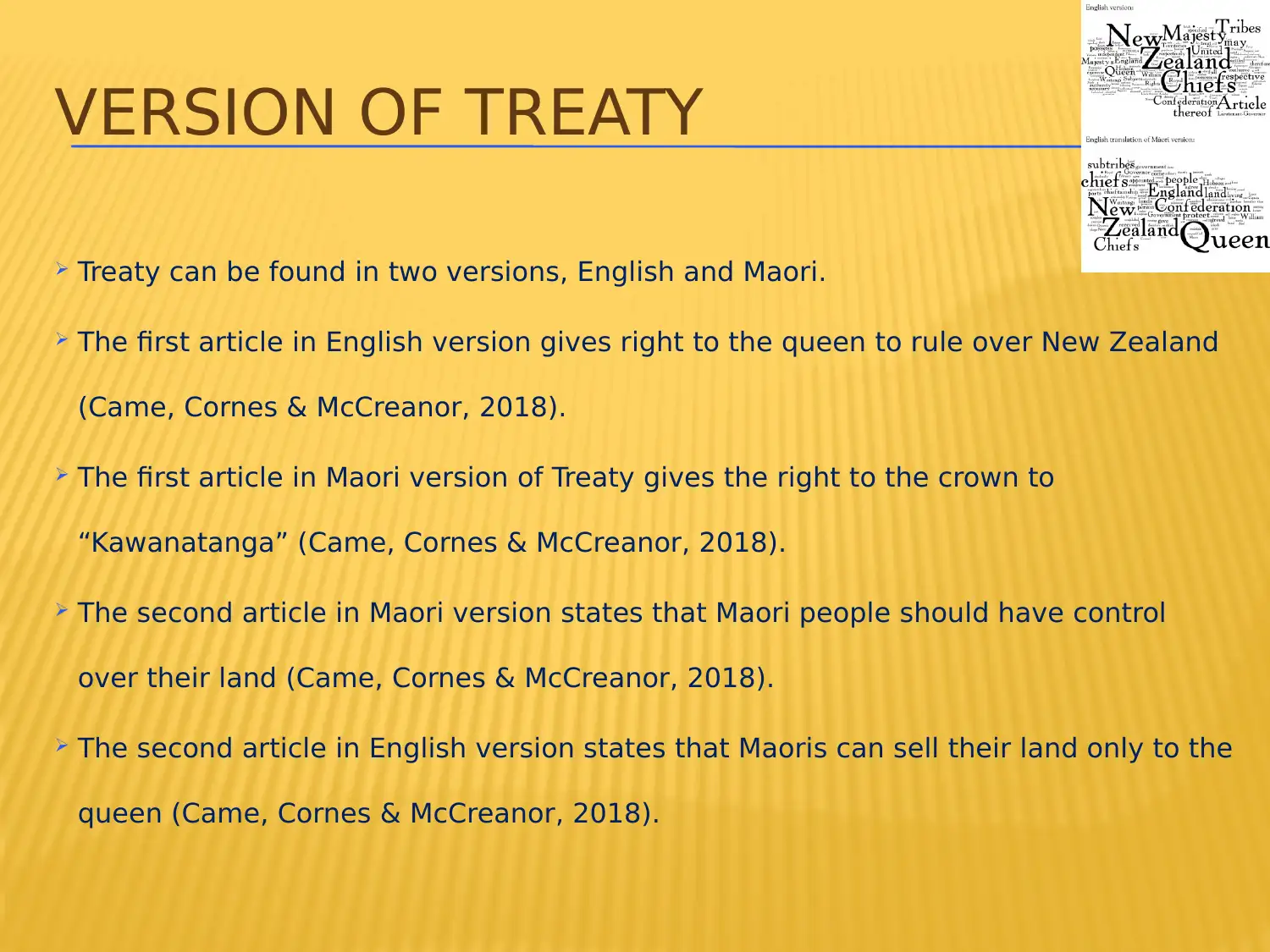
VERSION OF TREATY
Treaty can be found in two versions, English and Maori.
The first article in English version gives right to the queen to rule over New Zealand
(Came, Cornes & McCreanor, 2018).
The first article in Maori version of Treaty gives the right to the crown to
“Kawanatanga” (Came, Cornes & McCreanor, 2018).
The second article in Maori version states that Maori people should have control
over their land (Came, Cornes & McCreanor, 2018).
The second article in English version states that Maoris can sell their land only to the
queen (Came, Cornes & McCreanor, 2018).
Treaty can be found in two versions, English and Maori.
The first article in English version gives right to the queen to rule over New Zealand
(Came, Cornes & McCreanor, 2018).
The first article in Maori version of Treaty gives the right to the crown to
“Kawanatanga” (Came, Cornes & McCreanor, 2018).
The second article in Maori version states that Maori people should have control
over their land (Came, Cornes & McCreanor, 2018).
The second article in English version states that Maoris can sell their land only to the
queen (Came, Cornes & McCreanor, 2018).
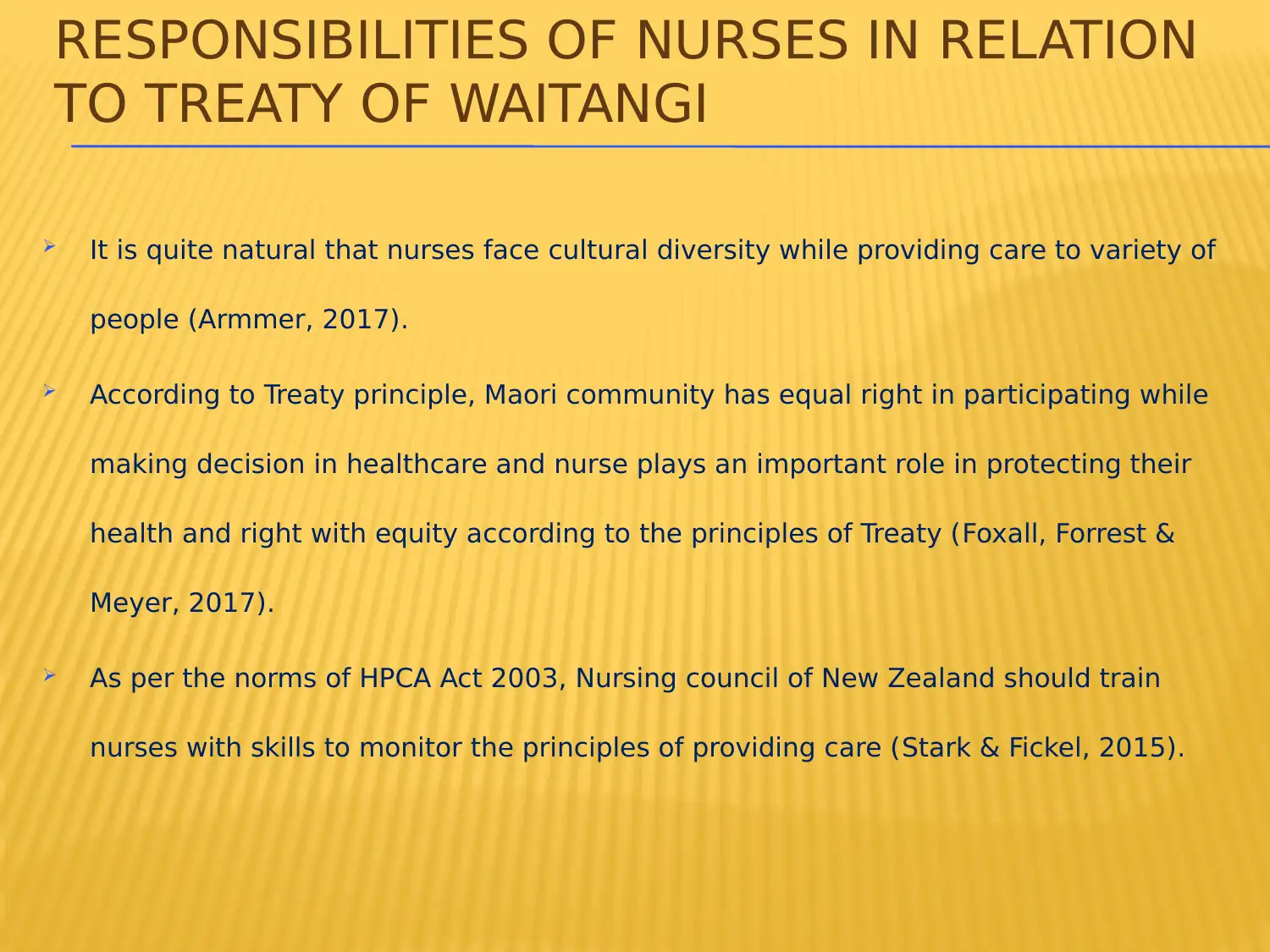
RESPONSIBILITIES OF NURSES IN RELATION
TO TREATY OF WAITANGI
It is quite natural that nurses face cultural diversity while providing care to variety of
people (Armmer, 2017).
According to Treaty principle, Maori community has equal right in participating while
making decision in healthcare and nurse plays an important role in protecting their
health and right with equity according to the principles of Treaty (Foxall, Forrest &
Meyer, 2017).
As per the norms of HPCA Act 2003, Nursing council of New Zealand should train
nurses with skills to monitor the principles of providing care (Stark & Fickel, 2015).
TO TREATY OF WAITANGI
It is quite natural that nurses face cultural diversity while providing care to variety of
people (Armmer, 2017).
According to Treaty principle, Maori community has equal right in participating while
making decision in healthcare and nurse plays an important role in protecting their
health and right with equity according to the principles of Treaty (Foxall, Forrest &
Meyer, 2017).
As per the norms of HPCA Act 2003, Nursing council of New Zealand should train
nurses with skills to monitor the principles of providing care (Stark & Fickel, 2015).
⊘ This is a preview!⊘
Do you want full access?
Subscribe today to unlock all pages.

Trusted by 1+ million students worldwide
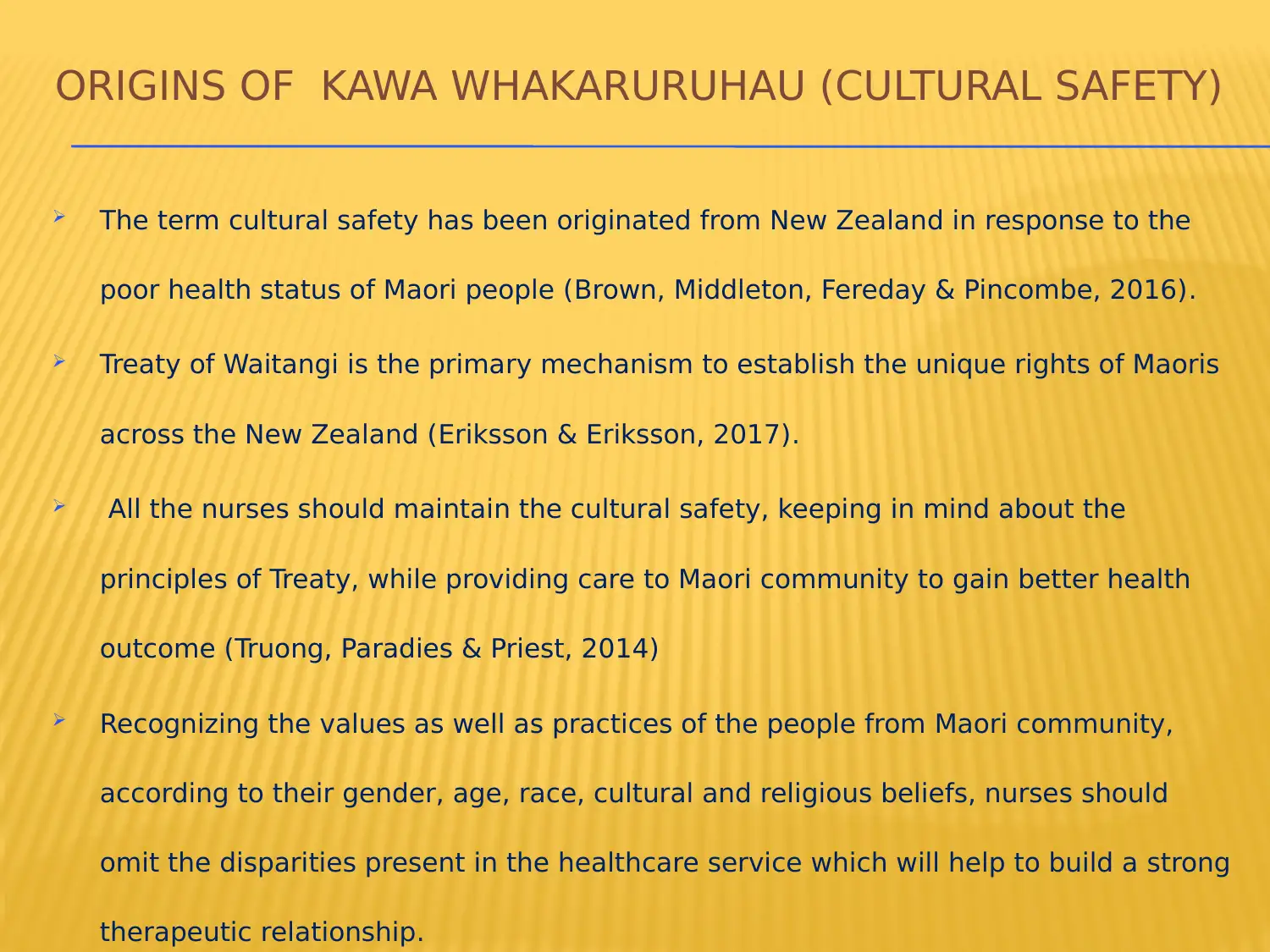
ORIGINS OF KAWA WHAKARURUHAU (CULTURAL SAFETY)
The term cultural safety has been originated from New Zealand in response to the
poor health status of Maori people (Brown, Middleton, Fereday & Pincombe, 2016).
Treaty of Waitangi is the primary mechanism to establish the unique rights of Maoris
across the New Zealand (Eriksson & Eriksson, 2017).
All the nurses should maintain the cultural safety, keeping in mind about the
principles of Treaty, while providing care to Maori community to gain better health
outcome (Truong, Paradies & Priest, 2014)
Recognizing the values as well as practices of the people from Maori community,
according to their gender, age, race, cultural and religious beliefs, nurses should
omit the disparities present in the healthcare service which will help to build a strong
therapeutic relationship.
The term cultural safety has been originated from New Zealand in response to the
poor health status of Maori people (Brown, Middleton, Fereday & Pincombe, 2016).
Treaty of Waitangi is the primary mechanism to establish the unique rights of Maoris
across the New Zealand (Eriksson & Eriksson, 2017).
All the nurses should maintain the cultural safety, keeping in mind about the
principles of Treaty, while providing care to Maori community to gain better health
outcome (Truong, Paradies & Priest, 2014)
Recognizing the values as well as practices of the people from Maori community,
according to their gender, age, race, cultural and religious beliefs, nurses should
omit the disparities present in the healthcare service which will help to build a strong
therapeutic relationship.
Paraphrase This Document
Need a fresh take? Get an instant paraphrase of this document with our AI Paraphraser
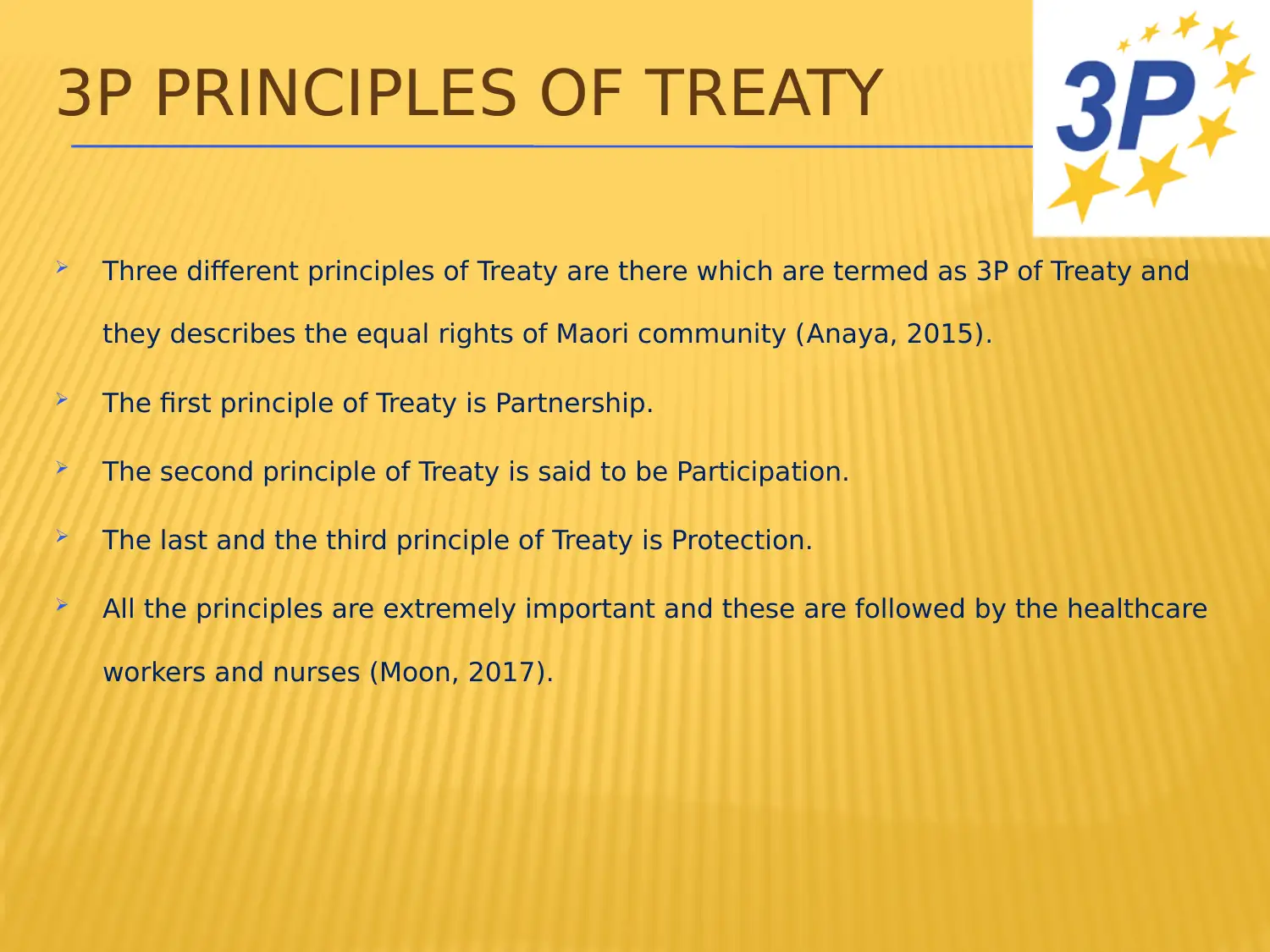
3P PRINCIPLES OF TREATY
Three different principles of Treaty are there which are termed as 3P of Treaty and
they describes the equal rights of Maori community (Anaya, 2015).
The first principle of Treaty is Partnership.
The second principle of Treaty is said to be Participation.
The last and the third principle of Treaty is Protection.
All the principles are extremely important and these are followed by the healthcare
workers and nurses (Moon, 2017).
Three different principles of Treaty are there which are termed as 3P of Treaty and
they describes the equal rights of Maori community (Anaya, 2015).
The first principle of Treaty is Partnership.
The second principle of Treaty is said to be Participation.
The last and the third principle of Treaty is Protection.
All the principles are extremely important and these are followed by the healthcare
workers and nurses (Moon, 2017).
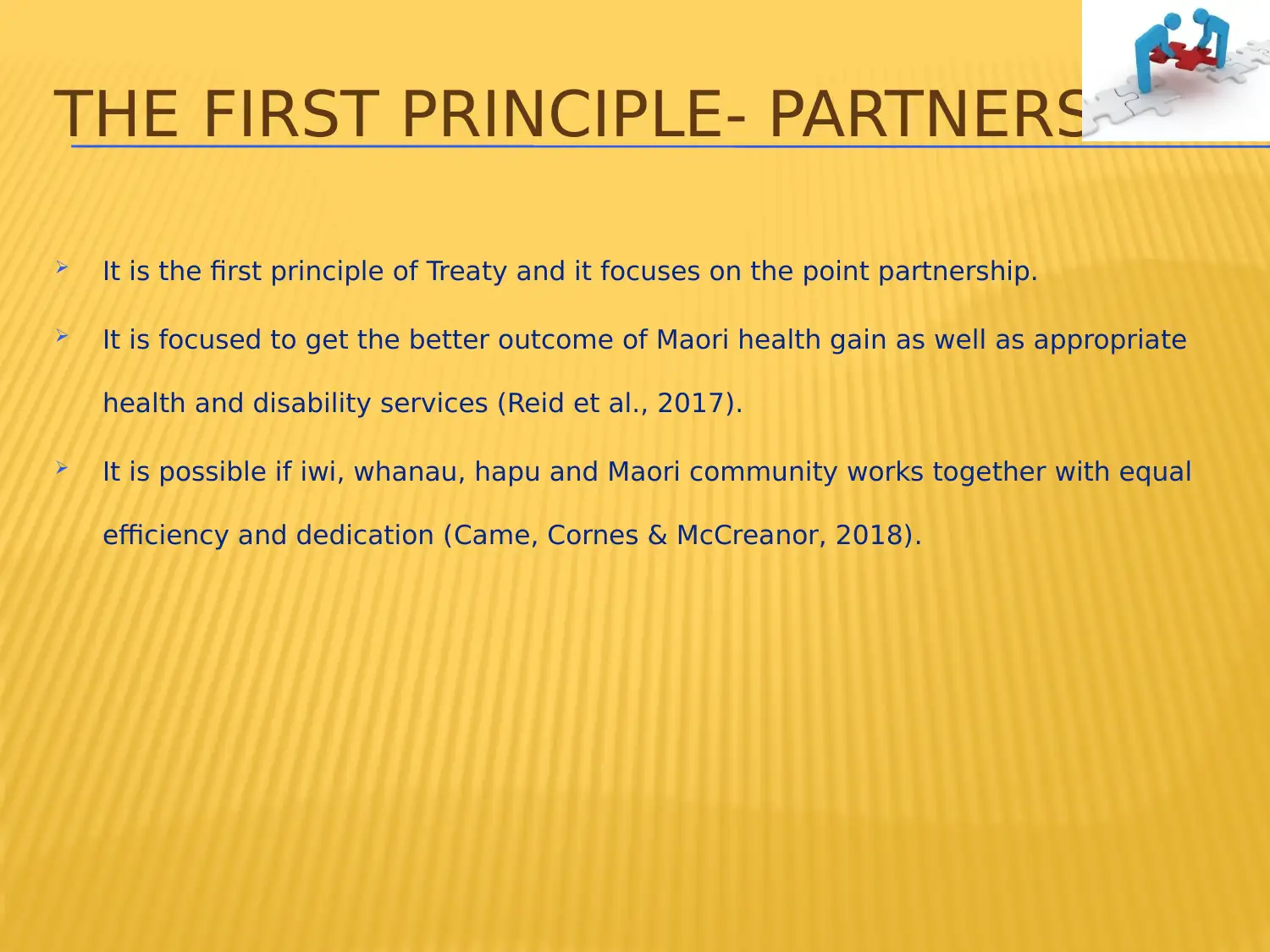
THE FIRST PRINCIPLE- PARTNERSHIP
It is the first principle of Treaty and it focuses on the point partnership.
It is focused to get the better outcome of Maori health gain as well as appropriate
health and disability services (Reid et al., 2017).
It is possible if iwi, whanau, hapu and Maori community works together with equal
efficiency and dedication (Came, Cornes & McCreanor, 2018).
It is the first principle of Treaty and it focuses on the point partnership.
It is focused to get the better outcome of Maori health gain as well as appropriate
health and disability services (Reid et al., 2017).
It is possible if iwi, whanau, hapu and Maori community works together with equal
efficiency and dedication (Came, Cornes & McCreanor, 2018).
⊘ This is a preview!⊘
Do you want full access?
Subscribe today to unlock all pages.

Trusted by 1+ million students worldwide
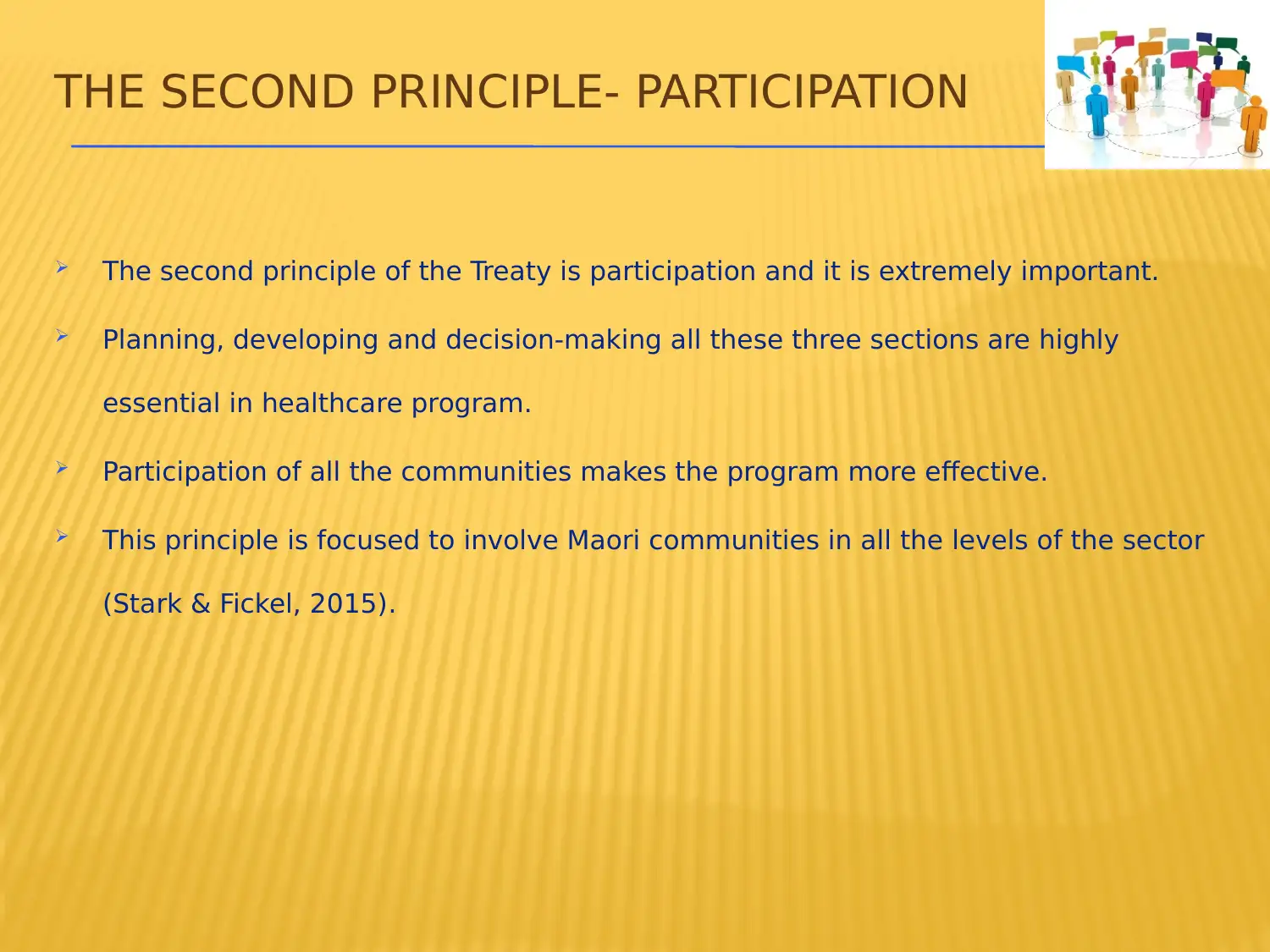
THE SECOND PRINCIPLE- PARTICIPATION
The second principle of the Treaty is participation and it is extremely important.
Planning, developing and decision-making all these three sections are highly
essential in healthcare program.
Participation of all the communities makes the program more effective.
This principle is focused to involve Maori communities in all the levels of the sector
(Stark & Fickel, 2015).
The second principle of the Treaty is participation and it is extremely important.
Planning, developing and decision-making all these three sections are highly
essential in healthcare program.
Participation of all the communities makes the program more effective.
This principle is focused to involve Maori communities in all the levels of the sector
(Stark & Fickel, 2015).
Paraphrase This Document
Need a fresh take? Get an instant paraphrase of this document with our AI Paraphraser
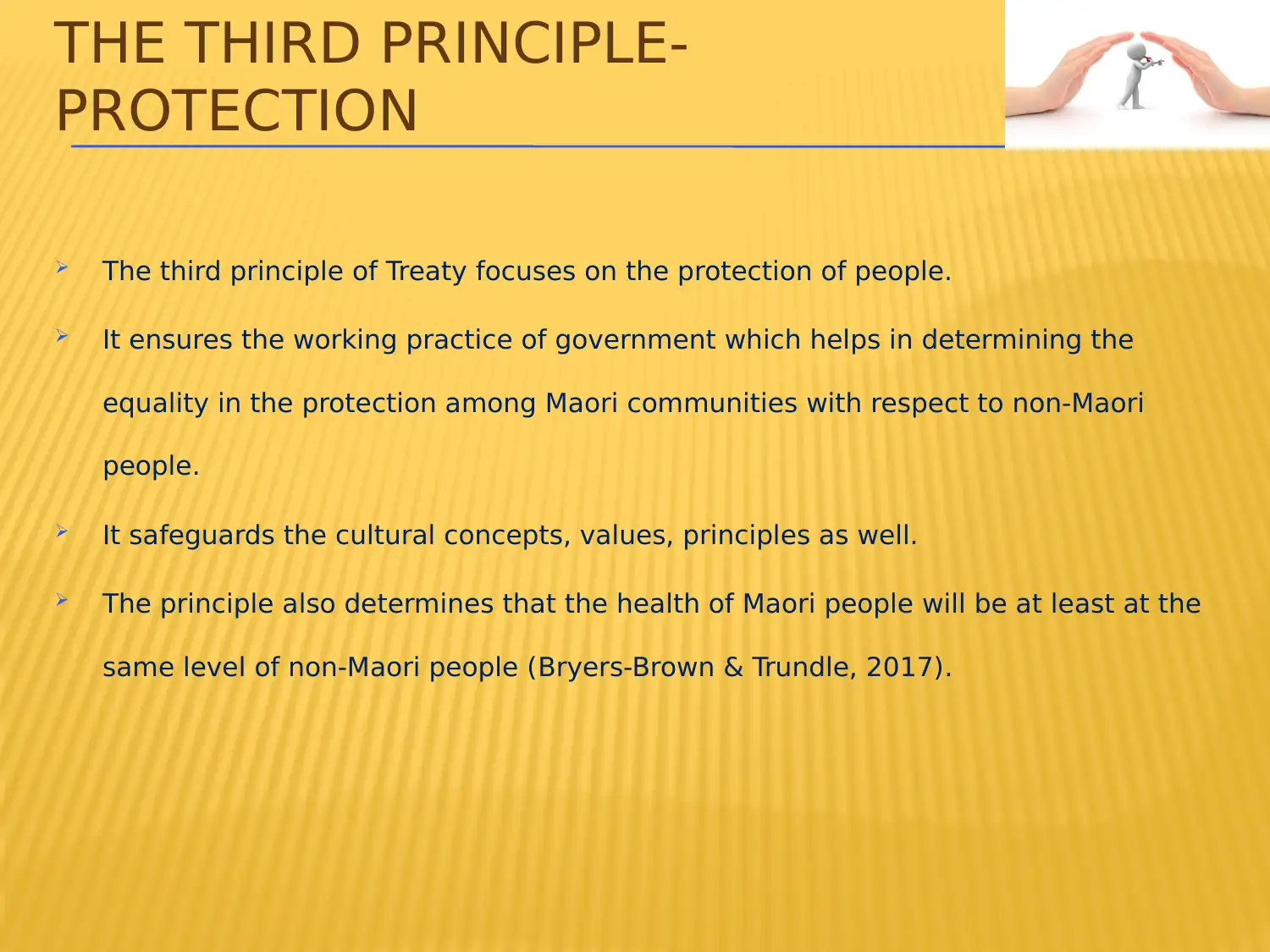
THE THIRD PRINCIPLE-
PROTECTION
The third principle of Treaty focuses on the protection of people.
It ensures the working practice of government which helps in determining the
equality in the protection among Maori communities with respect to non-Maori
people.
It safeguards the cultural concepts, values, principles as well.
The principle also determines that the health of Maori people will be at least at the
same level of non-Maori people (Bryers-Brown & Trundle, 2017).
PROTECTION
The third principle of Treaty focuses on the protection of people.
It ensures the working practice of government which helps in determining the
equality in the protection among Maori communities with respect to non-Maori
people.
It safeguards the cultural concepts, values, principles as well.
The principle also determines that the health of Maori people will be at least at the
same level of non-Maori people (Bryers-Brown & Trundle, 2017).
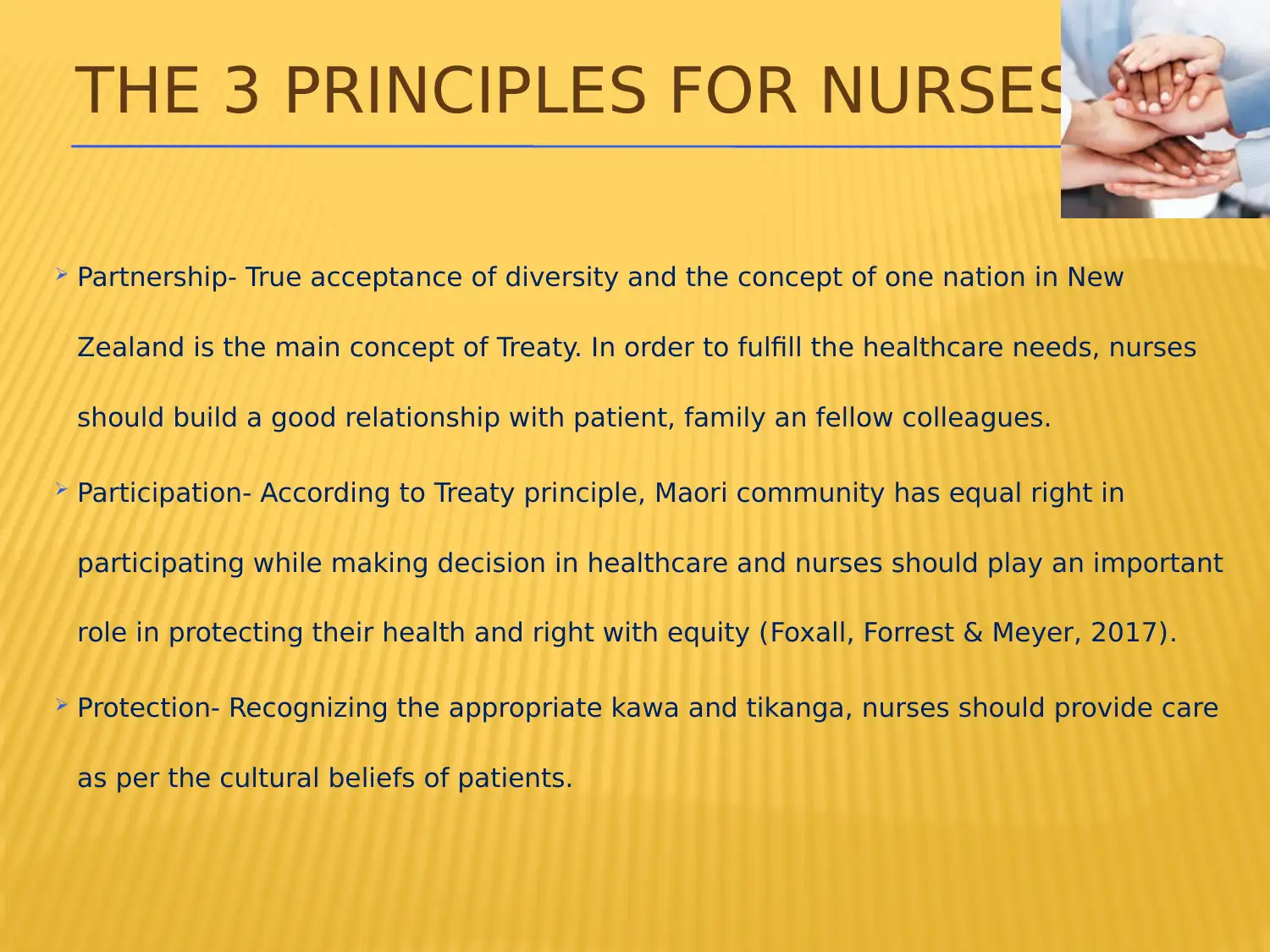
THE 3 PRINCIPLES FOR NURSES
Partnership- True acceptance of diversity and the concept of one nation in New
Zealand is the main concept of Treaty. In order to fulfill the healthcare needs, nurses
should build a good relationship with patient, family an fellow colleagues.
Participation- According to Treaty principle, Maori community has equal right in
participating while making decision in healthcare and nurses should play an important
role in protecting their health and right with equity (Foxall, Forrest & Meyer, 2017).
Protection- Recognizing the appropriate kawa and tikanga, nurses should provide care
as per the cultural beliefs of patients.
Partnership- True acceptance of diversity and the concept of one nation in New
Zealand is the main concept of Treaty. In order to fulfill the healthcare needs, nurses
should build a good relationship with patient, family an fellow colleagues.
Participation- According to Treaty principle, Maori community has equal right in
participating while making decision in healthcare and nurses should play an important
role in protecting their health and right with equity (Foxall, Forrest & Meyer, 2017).
Protection- Recognizing the appropriate kawa and tikanga, nurses should provide care
as per the cultural beliefs of patients.
⊘ This is a preview!⊘
Do you want full access?
Subscribe today to unlock all pages.

Trusted by 1+ million students worldwide
1 out of 22
Related Documents
Your All-in-One AI-Powered Toolkit for Academic Success.
+13062052269
info@desklib.com
Available 24*7 on WhatsApp / Email
![[object Object]](/_next/static/media/star-bottom.7253800d.svg)
Unlock your academic potential
Copyright © 2020–2025 A2Z Services. All Rights Reserved. Developed and managed by ZUCOL.





